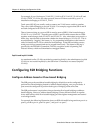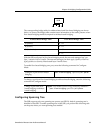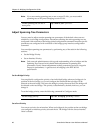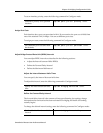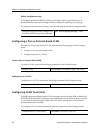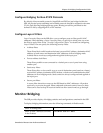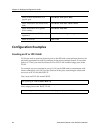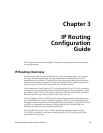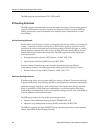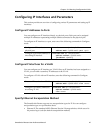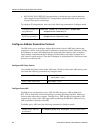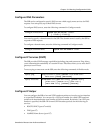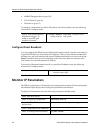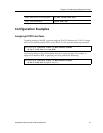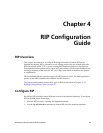
Chapter 3: IP Routing Configuration Guide
46 SmartSwitch Router User Reference Manual
The SSR supports standards based TCP, UDP, and IP.
IP Routing Protocols
The SSR supports standards based unicast and multicast routing. Unicast routing protocol
support include Interior Gateway Protocols and Exterior Gateway Protocols. Multicast
routing protocols are used to determine how multicast data is transferred in a routed
environment.
Unicast Routing Protocols
Interior Gateway Protocols are used for routing networks that are within an “autonomous
system,” a network of relatively limited size. All IP interior gateway protocols must be
specified with a list of associated networks before routing activities can begin. A routing
process listens to updates from other routers on these networks and broadcasts its own
routing information on those same networks. The SSR supports the following Interior
Gateway Protocols:
• Routing Information Protocol (RIP) Version 1, 2 (RFC 1058, 1723)
• Open Shortest Path First (OSPF) Version 2 (RFC 1583)
Exterior Gateway Protocols are used to transfer information between different
“autonomous systems”. The SSR supports the following Exterior Gateway Protocol:
• Border Gateway Protocol (BGP) Version 3, 4 (RFC 1267, 1771)
Multicast Routing Protocols
IP multicasting allows a host to send traffic to a subset of all hosts. These hosts subscribe
to group membership, thus notifying the SSR of participation in a multicast transmission.
Multicast routing protocols are used to determine which routers have directly attached
hosts, as specified by IGMP, that have membership to a multicast session. Once host
memberships are determined, routers use multicast routing protocols, such as DVMRP, to
forward multicast traffic between routers.
The SSR supports the following multicast routing protocols:
• Distance Vector Multicast Routing Protocol (DVMRP) RFC 1075
• Internet Group Management Protocol (IGMP) as described in RFC 2236
The SSR also supports the latest DVMRP Version 3.0 draft specification, which includes
mtrace, Generation ID and Pruning/Grafting.



